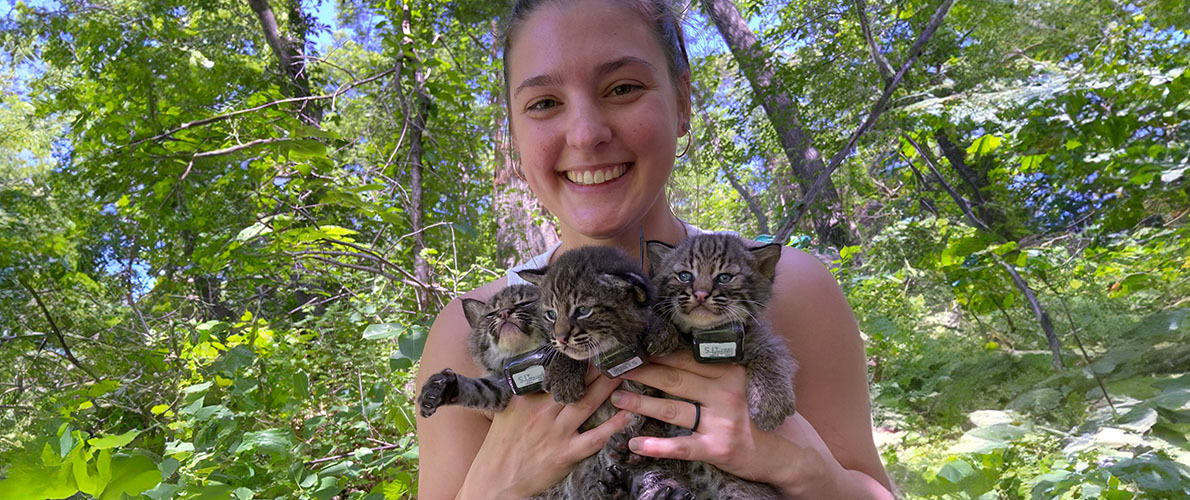Research Emphasis
Main Content

Research is an essential component of graduate study in Zoology at SIU Carbondale. For the M.S. and PhD degrees, we keep coursework requirements to a minimum. This allows our students to acquire hands-on experience and expertise in their chosen specialty through intensive and original research. Learn more about areas of specialization and connect with faculty by selecting an area of research emphasis:
Ecology and Ecosystem Studies
Faculty in this group specialize in research on biogeochemistry, conservation biology, food webs, predation, competition, disease ecology, nutrient cycling, and aquatic ecosystem function. Research in ecology and ecosystem studies also focuses on the influences of natural and human-created environmental gradients and disturbances on populations, species diversity, and ecosystem function.
Facility: SIU Ecology Center
Ecology and Ecosystem Studies Faculty:
- Frank E. Anderson
- Guillaume Bastille-Rousseau
- Jason L. Brown
- Michael Eichholz
- Kamal M. Ibrahim
- Michael Lydy
- James Garvey
- Charlotte Narr
- Gregory Whitledge
Environmental Toxicology
Environmental toxicology examines the fate of man-made and naturally occurring pollutants in natural ecosystems. It assimilates material from disciplines including biology, chemistry, genetics, ecology, mathematics, and physics.
Toxicologists in the Zoology Department emphasize analytical techniques to study the potential impacts of chemical stressors on fish, amphibians, birds, and other wildlife species, as well as the adverse effects of stressors, including chemical mixtures, on aquatic species.
Toxicology Faculty
Fisheries Biology and Aquaculture
Fisheries science explores the interaction among fish populations, the environment, and humans. Fisheries researchers confront issues ranging from managing harvest of fish populations to developing novel approaches for culturing finfish and shellfish. Courses and research in Zoology include fisheries ecology and management, ichthyology, fish genetics, fish health and nutrition, aquaculture, fish physiology, aquatic toxicology, and population genetics.
Facility: Fisheries and Illinois Aquaculture Center
Fisheries Faculty
Genetics, Evolution and Population Biology
Evolutionary biologists study the history of life on Earth, as well as the mechanisms producing variation in populations and adaptations in organisms. Systematics includes the study of phylogenetic history, species formation, species boundaries, classification, and biogeography. Researchers in Zoology tackle these problems from multiple perspectives but emphasize molecular approaches to population genetics (including molecular ecology and conservation genetics) and phylogenetics.
Genetics, Evolution and Population Biology Faculty
Wildlife Administration and Management
The Wildlife Administration and Management concentration area is only within our Professional Science Master's degree. This concentration prepares you to meet the standards required for certification as a Wildlife Society Certified Wildlife Biologist but also goes beyond the academic scope of a typical bachelor’s degree. You will gain essential skills in human dimensions, conflict resolution, and consensus building—key competencies for today’s land managers.
For this concentration, we partner with state and federal agencies as well as non-governmental organizations and are accredited by the National Professional Science Master’s Association. This collaborative program aims to equip graduates with a robust understanding of biological and ecological principles, ensuring they are fully prepared to make informed land management decisions in their professional careers.
Wildlife Ecology and Management
Wildlife management involves the application of ecological knowledge to seek a balance between the needs of wildlife species (typically terrestrial vertebrates) and human values. Political, social, and economic factors influence the methods and success of wildlife management in the stewardship and conservation of wildlife populations and their habitats. Wildlife ecology interfaces with disciplines in the natural and social sciences to address questions about managing wildlife populations.
Facility: Cooperative Wildlife Research Laboratory
Wildlife Faculty



